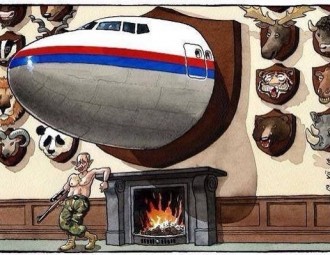Ulad Vialichka: Europe is growing sober, but its reaction is too slow

The EU is underestimating the long-term nature of the Russia-Ukraine conflict, which is already common-European.
The EU has prolonged sanctions against Russian officials and pro-Russian separatists. This decision was taken by the Foreign Ministers of the EU countries in relation to activation of hostilities and the east of Ukraine and Russia’s role in it. This decision is to be ratified at the Summit of the EU Heads on February 12.
The EU didn’t extend sanctions against Russia, though the discussion about it started immediately after the attack in Mariupol, in result of which 30 people died and more then 100 were injured. Instead of that European politicians promise to toughen sanctions in case the gunmen go on the offensive to Mariupol.
The reasons for the weak reaction of Europe to activation of hostilities in Ukraine “EuroBelarus” Information Service discussed with Ulad Vialichka, the head of the International Consortium “EuroBelarus”.
- The EU prolonged sanctions against Russian officials and terrorists for six months. Are these measures able to stop activation of hostilities in Donbas?
- Extension of the existing sanctions is hardly able to stop activation of hostilities, which are developing according to their own logic. Actions of the EU are clearly reactive and are very late. In this sense leaders of some European countries express their opinion more clearly and critically.
I think that Europe lacks clear strategy of how to stop escalation of violence in Ukraine.
On the other hand, now we are getting a clue of the real role Russia plays in this conflict. Europe is growing sober, but its reaction is too slow.
- The Foreign Minister of Germany Frank-Walter Steinmeier explained why the EU would toughen sanctions against Russia if gunmen go on the offensive to Mariupol. Why not to toughen sanctions after the attack in Mariupol? What has held the EU back this time?
- The same factors, and most of all – the depth of Russia-Europe economic relations. Europe is ambiguous; it consists of different interest groups, including business-interests. It is these groups that seek to postpone introduction of tough sanctions against Russia, which might boomerang against them and affect their own income. The result of fighting in the pro-Russian and radical lobby groups is a quite weak reaction of Europe to the Russia-Ukraine conflict.
From what is said, we can conclude that pro-Russian lobby in Europe is quite strong. And introduction of more radical sanctions against Russia is a blow against their own economic interests.
Tougher measures are possible when moral-value component of the conflict will take precedence over
the economic and pragmatic component. To all appearances, fire in Mariupol was the threshold that tipped the scales on the side of morality.
- With the symbolic expansion of sanctions opponents of anti-Russia actions activated, too. Is Russia splitting Europe?
- Russia won’t have enough strength to split Europe. Europe is rather defining its position re Russia and Ukraine.
Europe has hung undecided until it elaborates common efficient strategy re Russia’s actions in the region.
- Sanctions against Russia have been acting for quite long time to do certain conclusions: are they a limiting factor or they only made the aggression stronger?
- I would see sanctions against Russia as a limiting factor. Anyway, Russian economy is suffering from them. All players who look upon the situation in the light of economic interests have to take upon themselves consequences of sanctions. Russian government and business have to take into consideration consequences of sanctions and act starting from it, not because of patriotism.
But still we can’t ignore the hysteric component, when every action of the West causes spread-eagle reaction of the population and some politicians with rhetoric a la cold war.
- Germany and its partners in the EU exclude their military intervention into the conflict in Ukraine. However, neither the EU nor the US hurry to help Ukraine with arms to restrain military aggression. Why is it happening?
- There are two possible reasons.
Europe is underestimating long-term nature of Russia-Ukraine conflict, which is common-European now. Western societies tend to interpret this conflict as local warfare between Russia and Ukraine. Some politicians, who understand that Russia-Ukraine conflict is destroying European international relations, react to it tougher, too.
Second reason is the step between fear and responsibility. Any military aid to Ukraine now means transferring of the conflict on a new level, which will be perceived by Russia as another step to confrontation, increase of NATO military presence in the Eastern Europe. Taking into account Moscow’s inadequate and unpredictable decisions, its reaction is hard to predict.
I believe that the West will be refraining from direct military aid to Ukraine, unless the conflict switches to an open military aggression with intervention of regular Russian-identified army into Ukraine.
-
03.01
-
07.10
-
22.09
-
17.08
-
12.08
-
30.09








































